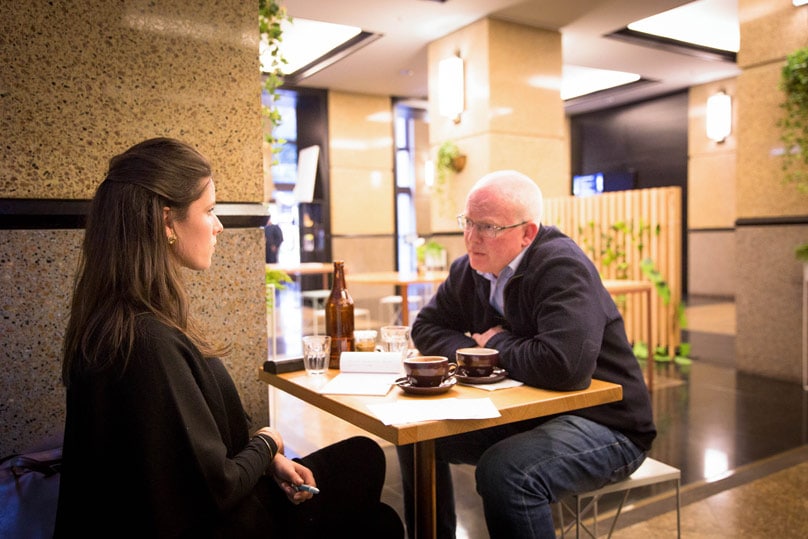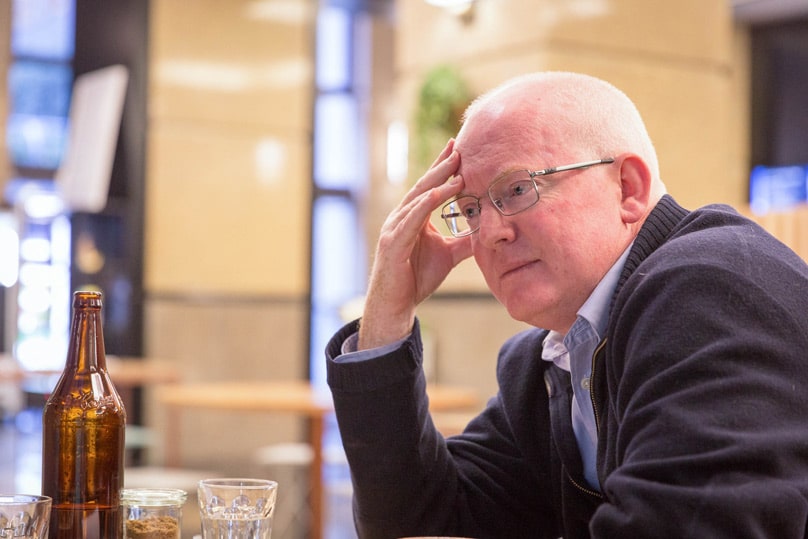
It was 12.35am local time, just after midnight, on the Indonesian prison island of Nusakambangan, 29 April 2015.
The night-time silence was shattered by the crack of ninety-six rounds fired simultaneously. This was not the first time the sound has been heard in Nusakambangan, the island where Indonesian authorities carry out state executions.
On the dock, just a few hundred metres away, stood a small group, a senior diplomat, solicitor Veronica Haccou and Melbourne-based barrister Julian McMahon AC.
McMahon recalls how their “ears were blown” by the 96 rounds as Indonesian justice was carried out.
The shots signalled the death of two of McMahon’s clients, Andrew Chan, 31, and Myuran Sukumaran, 34, along with six others convicted of drug related crimes.
“Each were strapped to a cross, each had a firing squad of twelve. Eight crosses. Eight people. 96 soldiers. They were very loud,” he told The Catholic Weekly.
Chan and Sukumaran are best known to Australians as the ringleaders of the infamous ‘Bali Nine’, a drug smuggling operation caught moving heroin from Indonesia to Australia in 2005.
When both were sentenced to execution by firing squad in 2006 (after a 2005 trial and appeals in that year and the next), McMahon took over the case pro bono, assisting senior barrister Lex Lasry QC.
When Lasry was appointed to the Supreme Court of Victoria in 2007, McMahon brought together a new team and for nine years, they fought, along with the lead lawyers of the case in Indonesia, to keep Chan and Sukumaran alive, but to no avail.

This was the not the first time Julian had been so close to an execution. Years before, in 2002, he took the case of Van Tuong Nguyen, a 22-year-old Vietnamese Australian arrested in Singapore for trafficking heroin. Julian agreed to defend Van, pro bono, together with Lasry, Theo Magazis an Australian solicitor, and a Singaporean lawyer, Joseph Theseira.
“Prior to 2002, I had not given much, if any, thought at all to the death penalty,” Julian told The Catholic Weekly.
He remembers being in the prison the day before Van’s execution, hearing Van’s mother and brother visit Van for the last time.
The only contact they could make with Van was through a small hole cut in the glass of the prison, a concession made by the Singaporean government after the intervention of then-minister for foreign affairs, Alexander Downer.
“We fought that case from December 2002, to December 2005,” he said.
Famously, the Singapore government did not grant clemency and the world watched as Van, just 25, was executed on 2 December 2005.
“One of the things that has never left my memory is when Van’s mother and brother were taken from him,” said Julian.
“I couldn’t see it happen, but I could hear it happen. And the howls, as they came up the corridor and came back to the room where we lawyers were, the sight of them and the intense involuntary grieving … have stayed with me and act as a reminder and a motivation that it is necessary to bring this kind of state-sanctioned, pre-meditated killing to an end.”
Today, Julian is Australia’s best-known opponent of capital punishment.
In late 2015, the year Chan and Sukumaran were executed, he became the president of Reprieve Australia, an NGO seeking to end capital punishment around the world.
In 2017 he was awarded the Companion of the Order of Australia, and was the 2016 Victorian nominee for the Australian of the Year. This October, he was awarded an honorary doctorate from ACU for his work fighting the death penalty.
From his first experience with Van Tuong Nguyen from 2002 to 2005, Julian became “slowly awakened to the consistent injustice of that penalty, country after country, case after case.”
According to statistics found on the Reprieve website, there are approximately 25,000 people on death row worldwide.
The countries with the highest rates of execution are China, Iran, Saudi Arabia, Iraq, Pakistan, Egypt and America.
According to the 2016 Amnesty International report Iran, Saudi Arabia, Iraq and Pakistan account for 87 per cent of the total known worldwide executions (1,032 people).
Chillingly, China does not publish information on executions, but it is suspected it performs more than all other countries combined, with conservative estimates at 3,000 per year.
It is no doubt a bloody business, but the jury is still out on the Church’s official position on capital punishment. The interview with Julian came at a time where there is some debate (strongest in American Catholic circles, but also in Australia) on the Church’s stance on executions.
On one side, a minority, are those who say it is a matter of justice–the greatest punishment for the greatest crime.
The position can be defended from Tradition, including statements from Scripture, the Church Fathers and even the current Catechism of the Catholic Church (#2227) that allows it in certain circumstances.
Edward Feser and Joseph Bessett’s recent book By Man Shall His Blood be Shed: A Catholic Defence of Capital Punishment gives a thorough overview. (Online editor: The book was recently reviewed by prominent Scripture scholar and philosopher-theologian David Bentley Hart.)
On the other side are those who look to Pope St John Paul II’s Encyclical Letter Evangelium Vitae issued in 1995, where he wrote that capital punishment should ideally be “abolished completely.”
In the encyclical the-then pope said that capital punishment could only exist in a society suffering a complete breakdown in law and order, a position later backed by popes Benedict XVI and Francis. Earlier this year, The Catholic Weekly contributor Mark Shea also wrote a nine-piece article defending this position.
For Julian, there is no question: “Having read widely for about 15 years, and having been caught up in the machinery accompanying the death penalty, I have gradually come to the view that there is simply never an occasion where an execution is justified,” he said.
A barrister with a background in classics, Julian says his opposition comes from a “bundle of ideas”, rather than one single reason.
First, he considers the most common reason that people oppose the death penalty – that innocent people may be put to death.
However, his is primarily a matter of principle, rather than practice.
“Even if a country is mistakenly so confident in its processes and its jurisprudence that it believes it could never unjustly sentence someone to death, then all the other reasons still apply,” he said.
Second “it keeps the people who work for the state – whether at the prison, medical, or judicial level – from being involved deliberately organising or doing the killing of another person … It keeps the state from being a deliberate killer.”
Julian also speaks of the “cruelty it does to the innocent family of the prisoner and all the people associated with that family”.
In his experience, capital punishment is nearly always a matter of politics, not justice.
“One thing I’ve learned over 15 years is that nearly all executions are first and foremost political. Almost every execution everywhere in the world required a serious political decision before it proceeds,” he said. “If you look at, for instance, in Singapore, the question whether clemency is granted is a question for Cabinet, who advise the president, so it is a political question. Or looking at the USA, we see people running for office off the back of either pushing particular executions, or being known for refusing or opposing clemency”.
That politics played a role was clearly the case with Van Nguyen. “He was small fry, he was very young, and he was clearly full of remorse and had reformed fully in prison,” said Julian. This was well publicised, and his case and leaders – including Pope John Paul II and Benedict XVI – intervened on his behalf.
However, the Singaporean government said, “its hands were tied”, and were unable to grant clemency.
“Of course, it could have granted clemency, it just made a political decision not to,” he said. Julian will continue with the work of Reprieve Australia, which will focus on Asia and the USA. He hopes, in time, to see systems established there that are able to mete justice without the death penalty, systems which are “healthy, and good for the community in the long run.”
